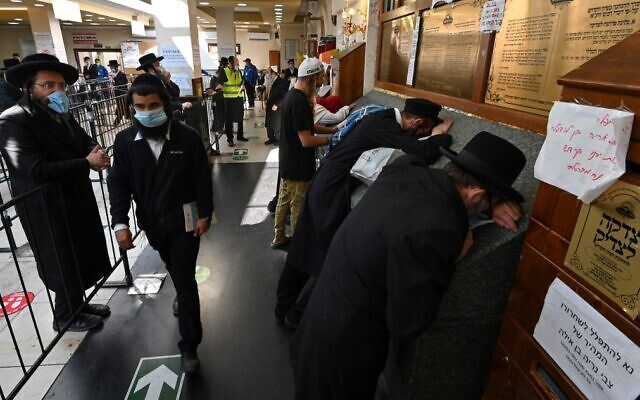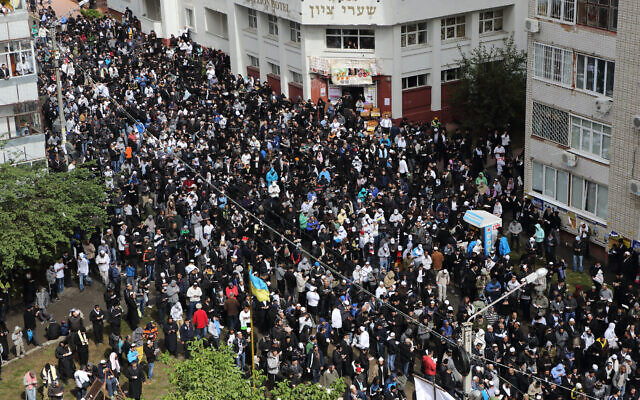KYIV, Ukraine (AFP) — Most of the Jewish pilgrims that camped out on the Ukrainian border with Belarus for several days have left after Kiev refused them entry, in line with its coronavirus rules.
Only “a few pilgrims” remained at the Novi Yarylovychi crossing, Ukrainian border guard spokesman Andriy Demchenko told AFP, compared to more than 1,000 on Thursday, while the Belarus border service said fewer than a dozen people were still attempting to cross.
At least 1,000 Orthodox-Jewish believers were camped out this week in no-man’s land between Ukrainian and Belarusian border crossings ahead of Jewish New Year celebrations which begin Friday and last until Sunday.
Tens of thousands of Hasidic Jews travel to the central Ukrainian city of Uman every Jewish New Year to visit the tomb of Rabbi Nachman, the founder of the Bratslav Hasidic movement.

Ukrainian border guards block the road on the Belarus-Ukraine border, in Belarus, September 15, 2020. (TUT.by via AP)
The standoff between the pilgrims and armed Ukrainian security services sparked tensions at the Novi Yarylovychi border crossing and inflamed a diplomatic row between Minsk and Kyiv.
Ukrainian border guard spokesman Demchenko said the number of believers hoping to enter Ukraine was steadily decreasing.

Jewish pilgrims stuck between the Belarusian and Ukrainian border crossings, September 16, 2020. (TUT.BY/AFP)
Demchenko added that he hoped those still seeking to make the journey to Uman understood that “the entry ban decision will not be revised.”
Belarus, which earlier said the pilgrims should be allowed to visit holy sites in Ukraine, confirmed that some religious believers had given up hope of being allowed to make the crossing.
Belarus’s state border committee representative, Anton Bychkovskiy, said that the numbers of pilgrims at border posts “were on the decline.”
Diplomatic spat
The believers — mainly Israeli, but also American and French — departed for Uman this year even though both the Ukrainian and Israeli governments last month urged them not to travel because of the pandemic.
An Israeli minister on Thursday called on those massed on the border to return home and uphold quarantine rules on arrival in Israel.
Kyiv closed its borders for most of the month of September citing a growing number of coronavirus infections, but the pilgrims attempted to bypass the restrictions by traveling through Belarus.
Ukrainian border guards announced Friday they had arrested several pilgrims, including Israeli and US citizens, trying to enter the country illegally from Hungary, Poland and Romania.

Hasidic Jews wearing face masks to protect against the coronavirus visit the tomb of Rabbi Nachman, the founder of the Bratslav Hasidic movement, days before the Jewish New Year in the town of Uman in central Ukraine on September 16, 2020. (Genya Savilov/AFP)
Kyiv has reported more than 169,000 cases of coronavirus and 3,468 fatalities. On Thursday, officials registered a record one-day increase in infections.
The standoff on the border aggravated already strained ties between Kyiv and Minsk, which have traded barbs over disputed presidential elections in Belarus last month.
Belarus strongman Alexander Lukashenko earlier told his officials to negotiate a travel corridor with Ukraine and offered to provide buses to transport religious believers to holy sites in Ukraine.
Kyiv in turn accused Belarusian authorities of giving false hope to the Hasidic pilgrims that they would eventually be allowed to travel to Uman.

Illustrative: Ultra-Orthodox men pray in the streets of Uman, Ukraine, during the Jewish holiday of Rosh Hashanah, September 4, 2013. (Yaakov Naumi/Flash90)
Both Ukraine and Israel are keen to avoid a spike in coronavirus infections. Israel imposed a second nationwide lockdown on Friday to tackle one of the world’s highest coronavirus infection rates, despite public protests over the new blow to the economy.
The three-week shutdown began Friday afternoon just hours before Rosh Hashanah, the Jewish New Year.
Meanwhile, up to 3,000 Hasidic Jews have arrived in Uman for the celebrations entering Ukraine before the ban, police said.
Law enforcement has tightened security near Rabbi Nachman’s tomb where pilgrims have congregated.
Related posts:
Views: 0
 RSS Feed
RSS Feed

















 September 18th, 2020
September 18th, 2020  Awake Goy
Awake Goy  Posted in
Posted in  Tags:
Tags: 
















